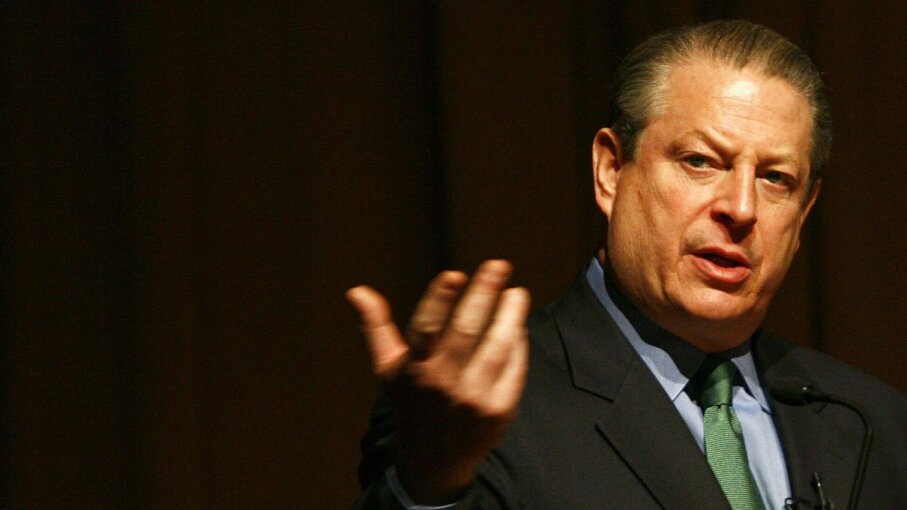Perhaps the underscored theme in the film An Inconvenient Truth is hope. But it is a certain kind of hope, a hope that is entrenched in perseverance and commitment. While Al Gore’s lectures all around the world seem heavily pronounced with this hope, despite the “inconvenient truth” of global warming, the tonal aspects of the film ultimately function as an accordion playing out signals for hope and alarm for the audience.
Al Gore, a quintessential underdog who has travelled all around the world, in order to save the world; for decades, doing the same work and improving upon it, even as time reveals more damage around the world from global warming; persisting, even when the naysayers call him a “hoax” or a threat to American society; he preserveres in his commitment and rings tirelessly the alarm bells of a “moral issue,” “not a political one,” all while reminding his audience that they have a choice and humankind can do anything, even the unthinkable, even the impossible.

Al Gore in 2007 discussing the impact humanity has had on the planet’s ecosystem. LLUIS GENE/AFP/GETTY IMAGES
The film’s incessant framing of Gore as a hero can be distracting to the significant messages in the film, such as the damaging effects of 2005’s hurricanes, the loss of polar bears , the increasing heat over the current years , and major potential disasters arising for Beijing and Calcutta. At each circumstance, I am waiting for more information, left with questions. What measures are being drawn up to prevent these issues? What new technologies could help us gain “dramatically altered consequences”?
But, at the same time, despite the film getting nowhere close to any resolve for any of these issues, it is, essentially, this certain hope of Al Gore that is to set the precedent for global warming awareness-raising. It is Gore’s universal commitment that is emphasized in the film. He travels the world, seeks out scientists, has been involved for decades, he thinks about the future. In some way, Gore is the “hero” of the [first wave of] climate crisis attention.
An Inconvenient Truth, despite its shortcomings or its conceits, ultimately presents a model for a behavioral approach to climate crisis: stick to truth, and stay with it, because, no matter what you may lose, nothing compares to losing the planet.
For more, check out: https://science.howstuffworks.com/environmental/conservation/conservationists/inconvenient-truth-sequel-al-gore.htm



I did not see the film when it originally premiered, but I would imagine “hope” was the overarching theme then. It was inspiring to see Gore carry this message into the halls of Congress, to the vice presidency, and then, after losing the presidency by a few hundred votes, to auditoriums around the world, educating people with the facts, one by one. He has devoted his life to this cause — and yet we’re still not on the right path in this country, generations after Roger Revelle first raised the alarm bells.
I am trying to think of this film now in light of this Thursday’s readings, specifically the Moser/Dilling piece about communicating climate change. What can we learn from the past about how we bring this message to people. I wonder if Gore’s presentations would be more effective if followed up with a presentation from Moser and Dilling, or an expert in how best to communicate these facts. Gore has preached to the choir, presumably, now how can the choir best preach to the masses?
The film is particularly interesting in light of Moser and Dilling’s work because Gore is a trusted messenger to the left. I’ll be interested to see what you think of Klein’s film where the heroes are the most vulnerable people responding on the front lines of climate change. Klein is not the hero of her own film in the way Gore is.
Thank you for this post! I really liked the textual analysis you engaged in with An Inconvenient Truth and how the ways in which a text is presented can change “the message.” Though Gore doesn’t traverse a “hero’s journey,” what I gather from the film and your post is the idea of perseverance, not change, being contextualized around heroism.
In a postmodern world filled with “fakery” (social media accounts, bots, news), can we say a public figure who is consistently abiding by one position and not hiding away from it becomes the “hero” of our times? If so, how does this affect deniers? Meaning, do you think a culture of compromise may be more beneficial to the project of Climate Change than valuing someone refusing to change since that may isolate those of another opinion? It could be too late for a compromise, but I am thinking of the pros and cons of a hero figure like Gore.